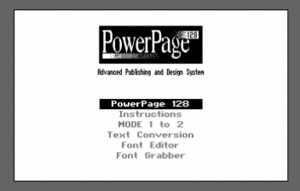Difference between revisions of "PowerPage"
m (added category) |
m (→Download) |
||
| (5 intermediate revisions by 5 users not shown) | |||
| Line 11: | Line 11: | ||
Perhaps PowerPage's greatest strength was its text-handling. Two types of font could be used: 16x16 'headline fonts' and standard 8x8. Both were fully proportional, with an 'autoflow' feature to wrap text around graphics, and pixel justification. The strong text features made it particularly suitable for fanzine work. | Perhaps PowerPage's greatest strength was its text-handling. Two types of font could be used: 16x16 'headline fonts' and standard 8x8. Both were fully proportional, with an 'autoflow' feature to wrap text around graphics, and pixel justification. The strong text features made it particularly suitable for fanzine work. | ||
| − | Other features included compatibility with [[Stop Press]]-standard .CUT clip art files, and automatic file compression (from v1.1 onwards). The keypresses for drawing lines, rectangles and dots were heavily influenced by the vector drawing utility in | + | Other features included compatibility with [[Stop Press]]-standard .CUT clip art files, and automatic file compression (from v1.1 onwards). The keypresses for drawing lines, rectangles and dots were heavily influenced by the vector drawing utility in [[The Graphic Adventure Creator]]. Companion utility programs on the PowerPage disc included a large headline generator, using fonts from the PD [[Printmaster]] utility. |
PowerPage's adoption by several fanzines (most notably [[Artificial Intelligence]]) proved a boon for the program, as fanzine editors fed back their suggestions on how to improve it. | PowerPage's adoption by several fanzines (most notably [[Artificial Intelligence]]) proved a boon for the program, as fanzine editors fed back their suggestions on how to improve it. | ||
Eventually, PowerPage was featured on an [[Amstrad Action]] covertape - although it had to be 'unpacked' to disc before running. | Eventually, PowerPage was featured on an [[Amstrad Action]] covertape - although it had to be 'unpacked' to disc before running. | ||
| + | |||
| + | == Download == | ||
| + | [[:File:PowerPage64.zip]] PowerPage 64 with manuals, courtesy of geebus | ||
== PowerPage 128 == | == PowerPage 128 == | ||
| + | [[Image:Power page screen 1.gif|right|thumb|300px|PowerPage 128 title screen]] | ||
PowerPage had originally been written as a 64k program not least because the author only had a 464! In time, however, a 128k version would be developed. | PowerPage had originally been written as a 64k program not least because the author only had a 464! In time, however, a 128k version would be developed. | ||
| Line 26: | Line 30: | ||
PowerPage 128 was revised several times to v1.2. Significant programming work was carried out for v1.5 but it was never released. | PowerPage 128 was revised several times to v1.2. Significant programming work was carried out for v1.5 but it was never released. | ||
| + | |||
| + | v1.0 was translated into German by [[Gert Genial]]. | ||
[[Category:Applications]] | [[Category:Applications]] | ||
Latest revision as of 08:03, 26 June 2019
PowerPage was an Almost PD desktop publishing program written by Richard Fairhurst. Many UK fanzines in the 1990s were produced with it.
There were two principal incarnations of the program - a 64k version and a 128k version. Several revisions of each were issued.
PowerPage 64
Originally known simply as PowerPage, the 64k version was one of many PD/low-price desktop publishing programs issued at the time. Others included Alan Scully's Pagemaker (in original, Plus, and Deluxe versions) and Geoff Smith's Advanced DTP.
All of these programs were designed for A5 output (typically 80 characters x 70 lines). PowerPage, however, was the only one to accommodate a full bitmapped page within a 64k machine. Since the page alone took up almost 44k of memory, part of it was always kept in screen memory, with the menus of the user interface otherwise restricted to just the bottom line of the screen. The program (part BASIC, part machine code) made great use of usually untouched corners of memory such as &BE80 and &AF00, and was split into several modules which would be loaded as the occasion demanded.
Perhaps PowerPage's greatest strength was its text-handling. Two types of font could be used: 16x16 'headline fonts' and standard 8x8. Both were fully proportional, with an 'autoflow' feature to wrap text around graphics, and pixel justification. The strong text features made it particularly suitable for fanzine work.
Other features included compatibility with Stop Press-standard .CUT clip art files, and automatic file compression (from v1.1 onwards). The keypresses for drawing lines, rectangles and dots were heavily influenced by the vector drawing utility in The Graphic Adventure Creator. Companion utility programs on the PowerPage disc included a large headline generator, using fonts from the PD Printmaster utility.
PowerPage's adoption by several fanzines (most notably Artificial Intelligence) proved a boon for the program, as fanzine editors fed back their suggestions on how to improve it.
Eventually, PowerPage was featured on an Amstrad Action covertape - although it had to be 'unpacked' to disc before running.
Download
File:PowerPage64.zip PowerPage 64 with manuals, courtesy of geebus
PowerPage 128
PowerPage had originally been written as a 64k program not least because the author only had a 464! In time, however, a 128k version would be developed.
The 128k version featured a greatly improved user interface that made using the program faster and much more pleasant - and more crash-proof if you had forgotten to replace the program disc. Many operations were carried out via pop-up menus and dialogue boxes.
New features included a zoom mode, a page preview, further improvements in text handling, and a (largely unsatisfactory) A4 print mode. The page size was increased slightly to 72 lines.
PowerPage 128 was revised several times to v1.2. Significant programming work was carried out for v1.5 but it was never released.
v1.0 was translated into German by Gert Genial.
